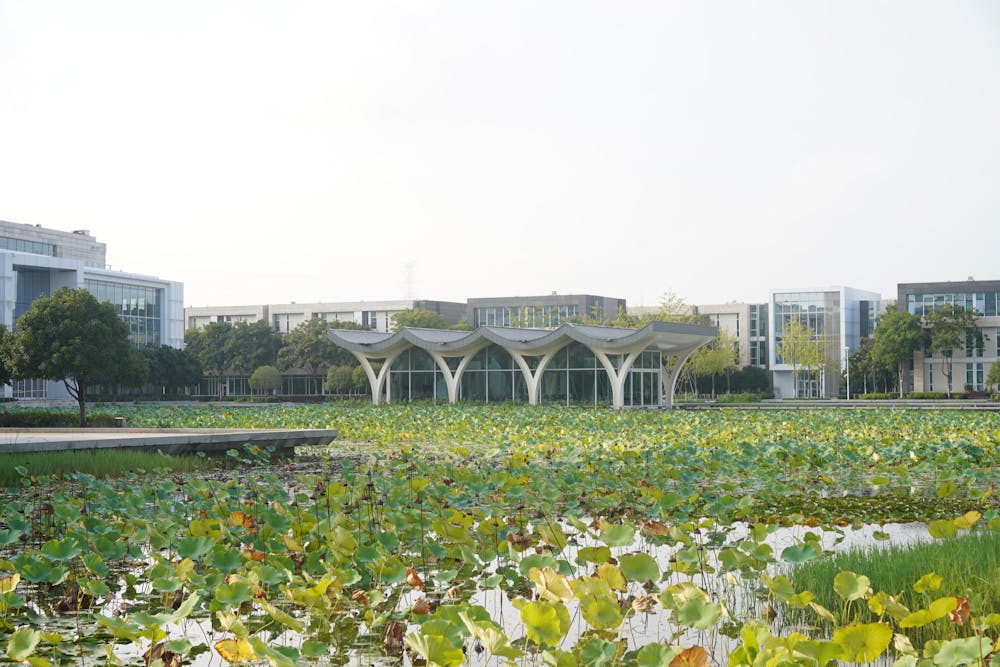Most Duke Kunshan University students from the Class of 2024 and 2025 began their college experience in Durham, when the onset of the COVID-19 pandemic made travel to China impossible. In the following years, several DKU students have applied to transfer to Duke, citing pandemic disruptions and academic differences as some of their reasons to return to Durham.
DKU is marketed as an opportunity for students to live abroad and gain exposure to a different language and culture, “combining hallmarks of a Duke education with Chinese tradition.” For international students who spent a year abroad in Kunshan, however, their experience did not live up to expectations, exacerbated by online classes, complicated visa logistics and difficulties transferring course credits.
Senior Tess Redman transferred from DKU to Duke for her junior year without ever visiting Kunshan. Spending her first two years studying abroad in Durham, Redman, along with other DKU international students, attended classes with Duke professors and immersed herself in the community at Duke. In the eyes of her Duke classmates, friends and professors, she was like any other Duke student.
“[DKU is] still figuring out what it wants to be, and it's still figuring out what it wants to be in relation to Duke,” Redman said. “There's kind of this tension about wanting to be a sister school to Duke and under the Duke umbrella, but also wanting to be separate, its own entity, which made me as a student feel very conflicted.”
The DKU-Duke transfer process
Every year, around 50 students transfer to Duke from another college or university, with a selective admission rate ranging from 3% to 7% over the past five years. Applicants from DKU are not given an additional advantage during the admissions process, although successful applicants were actively involved on-campus during their time in Durham.
Redman believes that her admission was largely due to her leadership roles and active participation on Duke’s campus. In both Durham and Kunshan, junior Shivam Mani engaged with research across a diverse range of fields, including sociolinguistics and political economy.
Mani, who transferred from DKU his junior year after spending the second half of his sophomore year in Kunshan, credited the success of his transfer application to his research involvements, academic performance — and Duke professors writing both his recommendation letters.
“I think those hit pretty hard — to have a voice here at Duke saying like, no, we want him back,” he said.
Reasons for transferring
Some DKU international students felt that their academic experience in Kunshan was less rigorous than it was in Durham.
Mani found himself more academically challenged at Duke in terms of the course load and amount of academic resources offered to students.
Unlike Duke’s semester system, DKU’s curriculum is organized into four seven-week terms within a quarter system. For Mani, this system limits students from exploring their academic pursuits to their full extent.
“I personally find it to be a drawback just because it's a pretty short window of time,” Mani said. “... especially for STEM people to learn [organic chemistry] in seven weeks or learn multi[variable calculus] in seven weeks … or explore the depths of political philosophy in seven weeks, you can't do it.”
Junior Sydney Chen, who attempted to transfer to Duke, shared Mani’s sentiments. She found the “intellectual stimulation” more intense at Duke, which she attributes to “the longevity of professors.”
The Kunshan campus, which just celebrated its 10th anniversary as the University prepares to kick off its Centennial, is also working to establish a more distinct student identity for itself, voting for its first mascot and restarting its annual orientation talent show as it welcomed its first in-person class since early 2020.
Although DKU's inaugural class founded a few clubs that are still thriving, Chen pointed out that there are limited long-standing student organizations at the Kunshan campus and noted that most of her club involvements had been at Duke instead of DKU.
“You don't have these clubs or as many alumni or classmen look up to or to receive mentorship from,” Chen said. “I think that was something that was hard for me because I want to go into consulting, and it's hard when you don't have those connections.”
After spending their first year at Duke’s Durham campus, Mani and Chen opted for a study abroad plan at DKU’s global site in Barcelona for their sophomore fall before actually setting foot in Kunshan their sophomore spring.
Chen, who will be returning to Kunshan in the spring after studying abroad at Duke this fall semester, described her frustration with the uncertainty of her academic plans.
“I really did not have a fun time because it was strenuous — you're spending a lot of money, you're spending a lot of time and it's very mentally exhausting to not know where I'm going to be next semester,” she said.
The constant move between campuses was also one of the biggest factors that prompted Redman to transfer. Redman recalled that, in her first year, she did not want to join any clubs to avoid attachments to Durham, knowing that she would eventually leave for Kunshan.
When her plans to study at DKU during her sophomore year did not materialize, she realized she did not want to start over halfway into her college career and “be a freshman again” at a new campus.
“I wanted to get to my home campus, and slowly but surely, I stopped thinking of Kunshan as my home campus. I started to think of Durham as my home base,” she said.
Get The Chronicle straight to your inbox
Signup for our weekly newsletter. Cancel at any time.
Lucas Lin is a Trinity first-year and a university news editor of The Chronicle's 120th volume.

